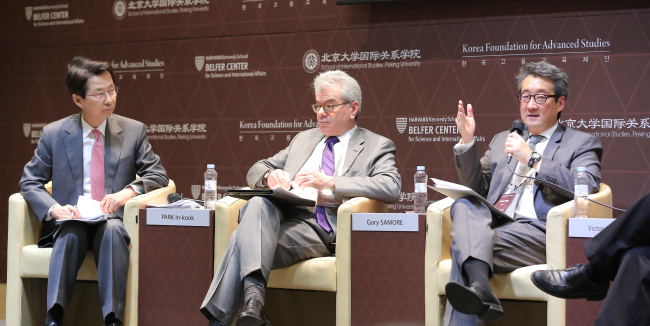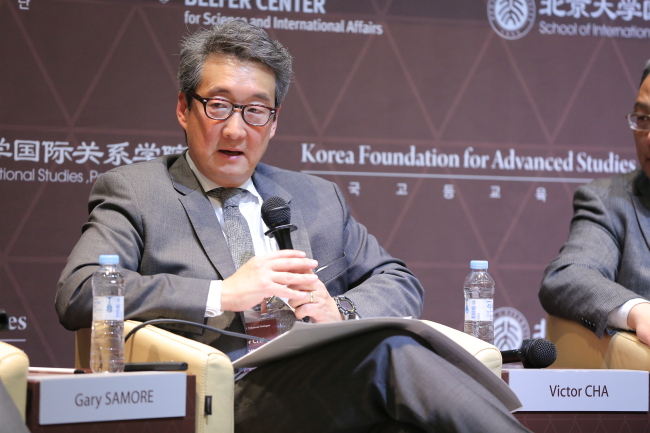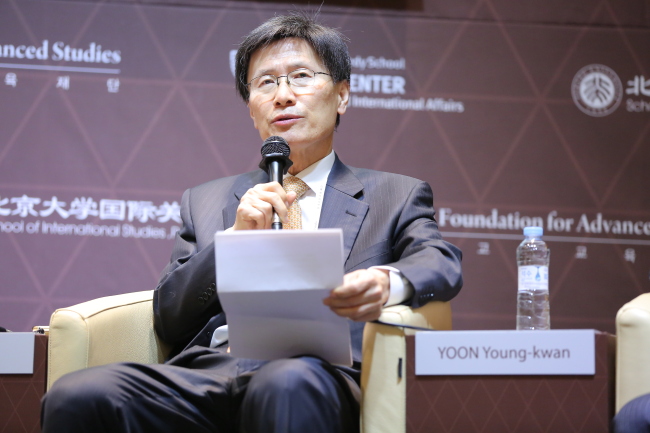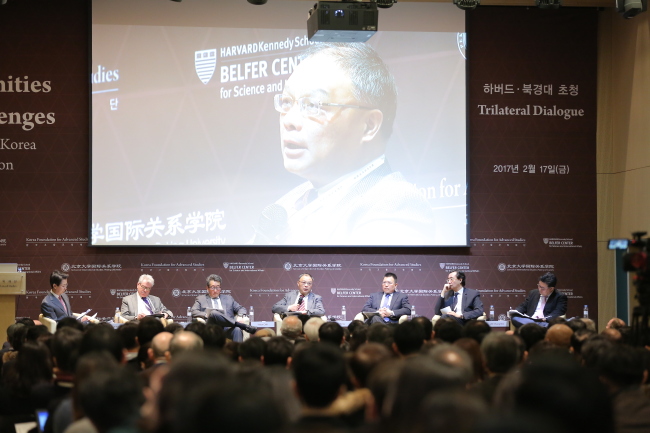‘US, China, Korea should work together against NK threat’
By Korea HeraldPublished : Feb. 27, 2017 - 17:34
With North Korea scaling up its nuclear and missile capabilities, the United States should consider taking higher policy risks to break the security deadlock and tamp down the communist regime’s proliferating threat, according to a former director at the White House’s National Security Council.
Victor Cha, speaking at a forum in Seoul on Feb. 17, said the new policy toward North Korea “should entail a higher level of risk acceptance,” as minimizing risk had restricted policy options and allowed Pyongyang to “incrementally, but significantly” grow its arms capabilities.
“No US policy should be composed only of sanctions, military exercises and diplomatic isolation,” Cha said at the academic conference, titled, “Trilateral Dialogue: Opportunities and Challenges for US-China-Korea Cooperation.” “Historians would remember such a policy as paving the path to war. A new US policy must entail greater risks, both in terms of coercive measures as well as diplomacy.”
Victor Cha, speaking at a forum in Seoul on Feb. 17, said the new policy toward North Korea “should entail a higher level of risk acceptance,” as minimizing risk had restricted policy options and allowed Pyongyang to “incrementally, but significantly” grow its arms capabilities.
“No US policy should be composed only of sanctions, military exercises and diplomatic isolation,” Cha said at the academic conference, titled, “Trilateral Dialogue: Opportunities and Challenges for US-China-Korea Cooperation.” “Historians would remember such a policy as paving the path to war. A new US policy must entail greater risks, both in terms of coercive measures as well as diplomacy.”

Cha is the director of the Asian Studies program at Georgetown University’s Edmund A. Walsh School of Foreign Service and senior adviser at the Center for Strategic and International Studies. He was previously the top adviser on North Korean affairs to former US President George W. Bush, when he directed Asian Affairs at the National Security Council.
Contending that Pyongyang would not give up its nuclear weapons, he said the communist regime’s weapons of mass destruction program poses a significant threat to the US, with the potential to unleash a regional nuclear breakout. North Korea’s nuclear progress will enlarge a homeland threat under the tenure of the current administration, he added.
Washington and Seoul have “no choice but to expedite” the deployment of the Terminal High Altitude Area Defense anti-ballistic missile system designed to shoot down short-, medium- and intermediate-range ballistic missiles to Korea, the policy wonk argued. He added that a regular rotation of military assets and capabilities to the Korean Peninsula should be reckoned to enhance the extended deterrence of US military might to its allies.
The two allies should also “keep the pressure on and expand the scope” of sanctions against Pyongyang, he urged, adding its slave labor exports and insurance fraud schemes involving third-party entities should be considered for sanctions.
“Secondary sanctions should also be considered. We need to work harder on the full enforcement of unilateral and multilateral sanctions,” he added, referring to the United Nations Security Council Resolutions 2270 and 2321, put into effect following Pyongyang’s two nuclear tests last year.

Following the assassination of Kim Jong-nam under widely speculated orders from his half brother, North Korean leader Kim Jong-un, in Kuala Lumpur on Feb. 12, China imposed the suspension of coal imports from the North from Feb. 19 through the end of the year. The resolution -- in line with the latest UN Security Council resolution adopted last December against Pyongyang’s fifth nuclear test -- is aimed at significantly curtailing North Korea’s coal exports: the country’s single biggest export item and source of hard currency.
Highlighting the North’s grave human rights violations, Cha said the new administration under US President Donald Trump “must make an early and high-level statement about the Democratic People’s Republic of Korea’s atrocious human rights record, and our support of recommendations by the UN Human Rights Council’s Commission of Inquiry” on rectifying the country’s rights violations.
Renewing the North Korea Human Rights Act in the US Congress, set to expire in 2017, provides an opportunity to secure more funding for the delivery of outside information into the hermit kingdom of North Korea, he added.
Yoon Young-kwan, professor emeritus at Seoul National University and former foreign minister of Korea, said the possible withdrawal of US leadership in and security commitment to Northeast Asia will embroil the region in “significant instability,” due to the lack of a multilateral security framework.

“If the US gives up its stabilizing role, there will be a rising arms race and nuclear armament among states,” he said. “This will adversely affect the economic environment in Northeast Asia, as high security tensions will spill over into the economy and worsen business environment, which will in turn reduce demands for American goods and services.”
In the US’ potential leadership vacuum, Yoon said, middle powers such as Japan, India, Australia and South Korea could rise up to the challenge and assume their greater share of diplomacy by more closely cooperating with one another and championing the liberal international order.
Yu Tiejun, associate professor at the School of International Studies and vice president of the Institute of International and Strategic Studies at Peking University, conceded that policy tools available to the US and South Korea were “very limited,” while China was split in its strategic calculation on the question of North Korea’s denuclearization.
The challenge for China, according to Yu, is how to reach a domestic consensus on the North Korea policy; balance its policy options toward the two Koreas; implement its regional “neighborhood policy” against flaring tensions on the Korean Peninsula; and respond to the demand of cooperation from the Trump administration.
The event was jointly organized by the Korea Foundation for Advanced Studies, Harvard Kennedy School Belfer Center for Science and International Affairs and Peking University’s School of International Studies.
By Joel Lee (joel@heraldcorp.com)

-
Articles by Korea Herald








![[Kim Seong-kon] Democracy and the future of South Korea](http://res.heraldm.com/phpwas/restmb_idxmake.php?idx=644&simg=/content/image/2024/04/16/20240416050802_0.jpg&u=)








![[KH Explains] Hyundai's full hybrid edge to pay off amid slow transition to pure EVs](http://res.heraldm.com/phpwas/restmb_idxmake.php?idx=652&simg=/content/image/2024/04/18/20240418050645_0.jpg&u=20240418181020)

![[Today’s K-pop] Zico drops snippet of collaboration with Jennie](http://res.heraldm.com/phpwas/restmb_idxmake.php?idx=642&simg=/content/image/2024/04/18/20240418050702_0.jpg&u=)